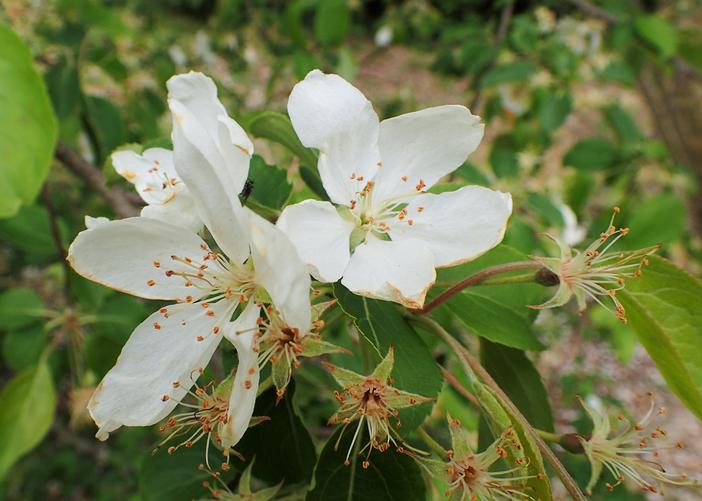Rock’s Crabapple
(Malus rockii)
Rock’s Crabapple (Malus rockii)
/
/

Krzysztof Ziarnek, Kenraiz
CC BY-SA 4.0
Image By:
Krzysztof Ziarnek, Kenraiz
Recorded By:
Copyright:
CC BY-SA 4.0
Copyright Notice:
Photo by: Krzysztof Ziarnek, Kenraiz | License Type: CC BY-SA 4.0 | License URL: https://creativecommons.org/licenses/by-sa/4.0 | Uploader: Kenraiz | Publisher: Wikipedia Commons









Estimated Native Range
Summary
Malus rockii, commonly referred to as Rock’s Crabapple, is a deciduous tree native to the temperate zone of China and Bhutan, often found in mixed forest margins, thickets, and along riverbanks. It typically grows to a height of 15-20 feet (4.5-6 meters) with a similar spread. Rock’s Crabapple is characterized by its attractive form, with a rounded crown and spreading branches. It produces showy pink to white flowers in the spring, followed by small, yellow-green fruits that may persist into winter. The bark is smooth and gray, adding to its ornamental value.
Rock’s Crabapple is valued for its springtime floral display and its ability to attract pollinators. It is used in cultivation for ornamental purposes in gardens and parks, often as a specimen tree or in mixed borders. This species prefers well-drained, loamy soils and full sun to part shade conditions. It is relatively low-maintenance but can be susceptible to common crabapple diseases such as apple scab and fire blight. Gardeners should be aware of these potential issues and select disease-resistant cultivars if available. Despite these concerns, Rock’s Crabapple remains a popular choice for its beauty and the ecological benefits it provides, such as serving as a food source for birds and other wildlife.CC BY-SA 4.0
Rock’s Crabapple is valued for its springtime floral display and its ability to attract pollinators. It is used in cultivation for ornamental purposes in gardens and parks, often as a specimen tree or in mixed borders. This species prefers well-drained, loamy soils and full sun to part shade conditions. It is relatively low-maintenance but can be susceptible to common crabapple diseases such as apple scab and fire blight. Gardeners should be aware of these potential issues and select disease-resistant cultivars if available. Despite these concerns, Rock’s Crabapple remains a popular choice for its beauty and the ecological benefits it provides, such as serving as a food source for birds and other wildlife.CC BY-SA 4.0
Plant Description
- Plant Type: Tree
- Height: 15-25 feet
- Width: 10-15 feet
- Growth Rate: Moderate
- Flower Color: White, Pink
- Flowering Season: Spring
- Leaf Retention: Deciduous
Growth Requirements
- Sun: Full Sun, Part Shade
- Water: Medium
- Drainage: Medium, Fast
Common Uses
Bird Garden, Butterfly Garden, Fragrant, Low Maintenance, Showy Flowers
Natural Habitat
Temperate zone of China and Bhutan, in mixed forest margins, thickets, and along riverbanks
Other Names
Common Names: Chinese Crabapple
Scientific Names: , Malus rockii, Malus baccata subsp. himalaica, Malus baccata var. himalaica, Malus dirangensis, Malus himalaica, Malus pallasiana var. himalaica, Malus rockii var. calvostylata, Malus ×floribunda f. scheideckeri, Malus ×floribunda var. scheideckeri
GBIF Accepted Name: